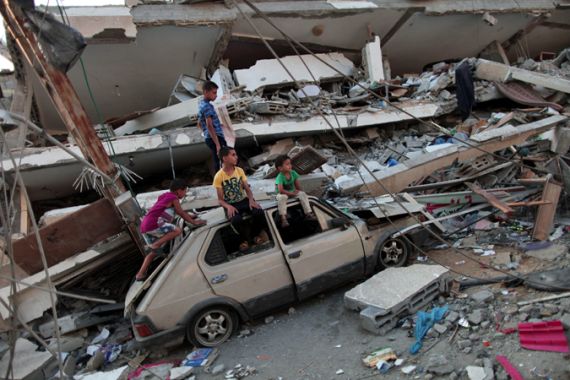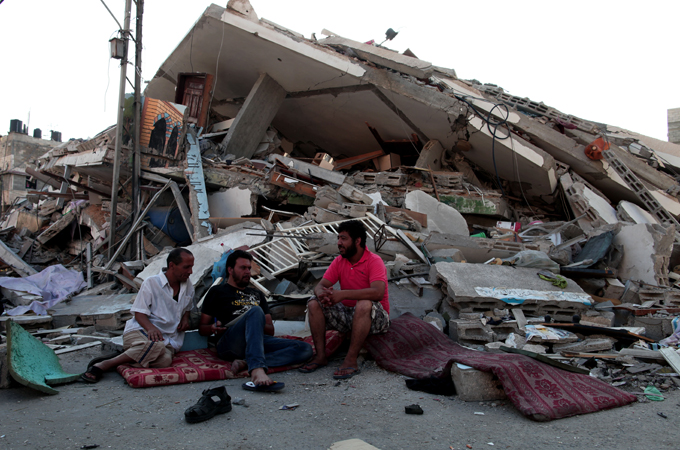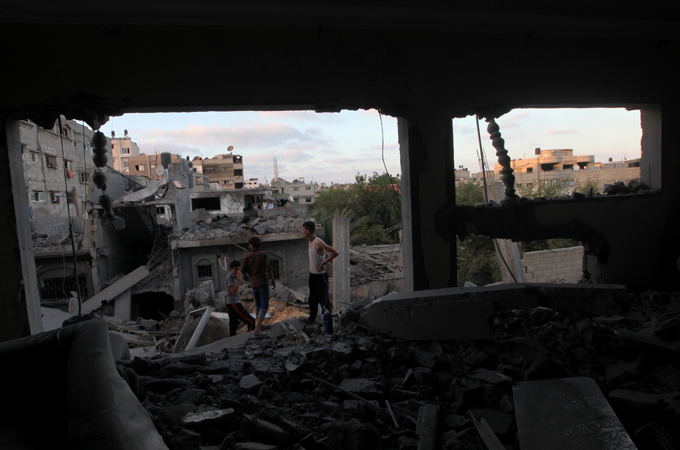Israeli buffer zone tightens Gaza chokehold
A buffer zone surrounding Gaza has been continuously bombed, with a high rate of civilian casualties.

Gaza City – Israel declared a three kilometre buffer zone inside Gaza’s borders last week, an area that represents 44 percent of Gaza’s territory. Anyone within the zone has been warned by the Israeli military to leave or risk being bombed.
This buffer zone has only exacerbated Gaza’s siege. To the east, Palestinians in Gaza are fenced in by Israeli artillery tanks, mortars, cannon shells and snipers. On Gaza’s western side, Israeli warships form a blockade and allow only a three-mile fishing zone. To the north resides more military checkpoints and soldiers. To the south, the Egyptian military has closed off the Rafah border.
Keep reading
list of 4 itemsInternational students risk immigration status to engage in Gaza protests
France blames Azerbaijan for New Caledonia violence: Unpacking their spat
‘Hell on Earth’ as violence escalates in Sudan’s el-Fasher
The buffer zone has tightened the Israeli chokehold around Gaza’s small strip of land.
 |
| Dogmush believes that the Israeli policy is deliberate to drive people away from Hamas [Emad Nassar/Al Jazeera] |
Essam Dogmush, 25, ran a family business renting out apartments in the residential tower where he and his family also lived. He said the building was reduced to rubble immediately after he received a phone call from the Israeli army at midday. The caller on the other end of the line simply ordered him to evacuate the building. Dogmush rushed to each apartment screaming “Israel is going to bomb the building.”
The bombing of the seven-story residential building left 21 families homeless.
“Why our building, I don’t know? These are poor people who haven’t been able to pay their debts due to lack of access to [their] salaries,” he said, while holding a bill he found on top of the rubble showing the debt of someone in his building.
Dogmush believes this present Israeli policy is deliberate in trying to pressure and drive people away from the Hamas resistance. But he insists that his business was politically neutral. “I usually check that people are not affiliated with political factions, before renting them out,” he told Al Jazeera.
Dogmush sat on top the rubble counting how many people lived in the building. On average, 10 family members lived in each apartment.
“Nowhere is safe,” he said.
RELATED: Israel strikes Gaza apartment blocks
Jalal Jundia, 41, has been displaced for a second time in 10 days.
“Last week, our home was demolished in Shujayea, I sought shelter with relatives in this building, but it was bombed again,” he said while trying to comfort his terrified children.
Jundia was a Palestinian Authority (PA) civil servant who got laid off seven years ago due to internal Palestinian political strife.
He is the father of six children – aged 3 to 15 – who are now left with nowhere else to go.
“We had no time to evacuate the building – the drone missile struck while we were still inside, we only just managed to get outside before the F16 missile hit,” Jundia told Al Jazeera.
Suliman Jarboe, 51, lives nearby. He described how “women and children had run from their homes, some still wearing [just] underwear”.
 |
| Mohammed Nassar inspects the damage caused to his house after it was hit on Thursday [Emad Nassar/Al Jazeera] |
“I had to protect them in my home, and now they have nothing to wear and nowhere to hide,” he said. Jarboe was also laid off work eight years ago after working most of his life as a construction worker in Israel.
After performing Umrah in Saudi Arabia recently, Abdullah Nassar was hosting some friends when he received a phone call that told him, “Mussa speaking from the Israeli Defence Army. Evacuate because we will bomb the house.” The first missile came from a drone and hit a house nearby.
“Israel says that we are targeting civilians. But they know that we are also innocent civilians here,” he said as he gathered decorations from a guest room.
Nassar expressed concerned about the future of his family – his entire neighbourhood had to evacuate and he feels that his new location is not safe enough to stay.
“With schools and hospitals also being bombed, we have no alternatives, other than making tents and waiting to die in them.”
RELATED: ‘Only stones remain’: Gaza lies in ruins
“When there is nowhere to run, because schools and hospitals are being targeted, people who still have a home [will] open their doors to host others,” said 72-year-old Umm Wael Nassar, who had fainted as she ran from her home just before an Israeli missile struck.
When she arrived at al-Shifa hospital, she realised her house had been hit but no one was injured.
“Thanks to God, no one was hurt or killed, and that’s what really matters,” she said.
Al Jazeera met with her just minutes after the bomb struck the house, as her grandchildren collected fragments of belongings – some poetry written by a young teenager, textbooks and mathematical equations that needed to be remembered for a summer school exam.
Umm Wael sat among the ruins of her destroyed home holding a traditional Palestinian dress. “I know of no state which bombs and demolishes homes on top of the owenrs’ heads,” she said, referring to several families whose homes collapsed on them during Israeli missile strikes. While glancing nervously up at the sky as Israeli drones hover and buzz overhead, Umm Wael told Al Jazeera how her house was built less than two years ago. The smell of explosives and incendiaries filled the area as several buildings nearby also were hit.
“Even the people living next to us had to evacuate, with nowhere to hide.”
“We will remain patient, no matter what. Israel is shooting itself … this is enough, enough of this madness,” Umm Wael said as she pondered where she, her daughter-in-law, and her four siblings would go.
Meanwhile, twice-displaced Jundia said he has no option but to return to the ruins of his home.
“Whether Israel creates a buffer zone, or makes more land ‘off-limits’, we will return and live in tents built on the ruins of our homes.”